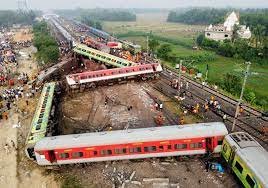The death toll in the devastating train accident in Balasore has risen to 291, as another passenger succumbed to his injuries at SCB Medical College Hospital. The deceased passenger has been identified as Sahil Mansur, a 32-year-old resident of Roshanpur in Bhagalpur district, Bihar. He had been receiving treatment at the hospital’s Intensive Care Unit (ICU) in the trauma care ward. According to hospital sources, Sahil Mansur was not only recovering from the injuries sustained in the accident but also battling a kidney-related ailment. He was undergoing dialysis treatment at the time of his demise.
Dr. Sudhansu Sekhar Mishra, the Superintendent of SCB Medical College Hospital, stated that Sahil Mansur passed away due to a cardiac arrest. The patient had suffered both internal and external injuries as a result of the accident, in addition to his pre-existing renal issues. The unfortunate incident has further added to the grim toll of the Balasore train accident, which has left countless families mourning the loss of their loved ones.
The train accident, which occurred on a fateful day, has shocked the nation and prompted discussions about safety measures and infrastructure in the railway sector. The incident took place at a railway crossing near Balasore, when an express train collided with a goods train, resulting in a horrific scene of destruction. The impact of the collision caused several coaches to derail, leading to numerous casualties and injuries.
Rescue operations were immediately initiated following the accident, with emergency personnel and local authorities rushing to the site to provide assistance. The injured were swiftly transported to nearby medical facilities, including SCB Medical College Hospital, for urgent treatment. The medical staff at the hospital worked tirelessly to stabilize the victims, many of whom had sustained severe injuries.
The news of Sahil Mansur’s demise has left his family and friends devastated. As they come to terms with their loss, questions are being raised about the adequacy of safety measures at railway crossings and the need for improved medical facilities to handle such mass casualties. The incident has once again highlighted the urgent need for comprehensive safety audits and enhancements in the railway infrastructure across the country.
Government officials and railway authorities have expressed their condolences to the families affected by the Balasore train accident. They have promised a thorough investigation to determine the causes of the accident and to hold those responsible accountable. Prime Minister [Name] has also extended his sympathies to the victims’ families and directed the concerned authorities to provide all necessary assistance and support to the affected individuals.
As the nation mourns the loss of lives in this tragic incident, the focus now shifts to implementing stricter safety protocols and ensuring the well-being of passengers traveling on trains. Efforts must be made to address any existing infrastructure gaps and enhance emergency response capabilities to minimize the impact of future accidents. It is imperative to learn from such incidents and take concrete steps to prevent similar tragedies from occurring in the future.
The Balasore train accident serves as a stark reminder of the fragile nature of human life and the importance of prioritizing safety in all aspects of transportation. It is hoped that this incident will spur meaningful action and bring about positive changes in the railway sector, ensuring the well-being and security of passengers across the country.




